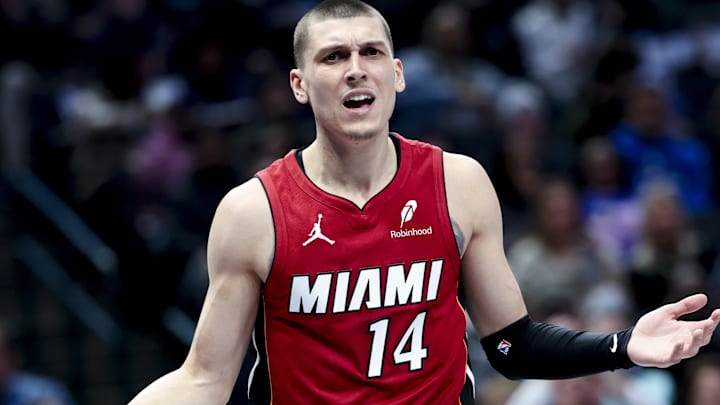Tyler Herro’s long-term future with the Miami Heat is very much up in the air. And at this point, you can say the same about his immediate role. Miami’s offseason moves—or lack thereof—suggest he will be tasked with even more playmaking responsibility.
This complication has flown under the radar as people take stock of the Heat’s bigger picture. They clearly have designs on stockpiling assets and financial flexibility, and Herro’s extension eligibility this October flies in the face of that longer view. He could turn into collateral damage of the long game, or become the wrench in their plans.
Immediately, though, Miami is clearly aiming to remain competitive in the Western Conference. Head coach Erik Spoelstra may run his rotation in a way that gives off gap-year vibes, but the Heat would not have traded for a 32-year-old Norman Powell if it wasn’t planning to disprove the low expectations set for them.
Ironically enough, it’s the Powell acquisition that thrusts Herro’s role back into limbo.
The Heat need Herro to be more of a floor general
Much like Herro himself, Powell is considered a perimeter play-finisher. He brings more rim pressure, but not as much self-creation, and not nearly as much table-setting for others.
Miami, in fact, altogether punted on pursuing a primary playmaker. Teeing up others is not Davion Mitchell’s strong suit. The same goes for Terry Rozier, assuming he even plays, and Dru Smith. Kasparas Jakucionis may have the floor-general gene, but it doesn’t seem like he’ll get a ton of reps from the jump.
Herro stands alone here. He could potentially be joined by Pelle Larsson, but primary-playmaker expectations shouldn’t be foisted upon someone who’s logged fewer than 800 NBA minutes.
Most will view this as a bug in the Heat’s machine rather than a feature. They’re not wrong. Miami would have a better playmaking lifeline in tow if given the choice. Yet, at the same time, their roster construction says a lot about their faith in Herro.
Herro could continue leveling up as a passer
Miami’s (apparent) faith in its 25-year-old is far from misplaced. He averaged a career-high 5.5 assists per game last season, while also effectively overhauling his shot distribution. Undergoing that evolution is impressive in a vacuum. It’s even more head-turning when it happens amid Defcon 1-level Jimmy Butler drama.
Members of the Heat and their fans shouldn’t just be encouraged by the raw numbers, either. Herro has improved his feel as a table-setter. His patience, vision, and overall ball control were all noticeably better.
Some of the live-dribble bad-pass turnovers can be infuriating. They also come with the territory of having such a huge offensive role.
The folks over at BBall Index developed a Passing Efficiency metric, which analyzes “how well a player takes care of the ball as a passer, and does so by comparing rates of bad-pass turnovers with expected rates, given the player’s ball dominance, how often they’re generating shots for teammates, the quality of those shots, and the versatility in pass types executed.” Herro finished in the 97th percentile of this category, while averaging around 5.2 high-value assists per 75 possessions—an elite blend of volume and efficiency shared by only 14 other players, almost all of them superstars.
Granted, the Heat’s offense when he played without Butler didn’t sing. But it was around league average. That’s a caps-lock FEAT when looking at some of those lineups.
Surrounding Herro with someone like Powell should help elevate his playmaking—and, as a result, the ceiling of Miami’s entire offense.
